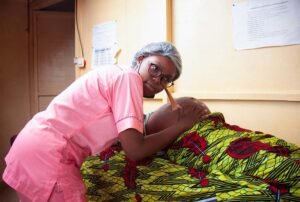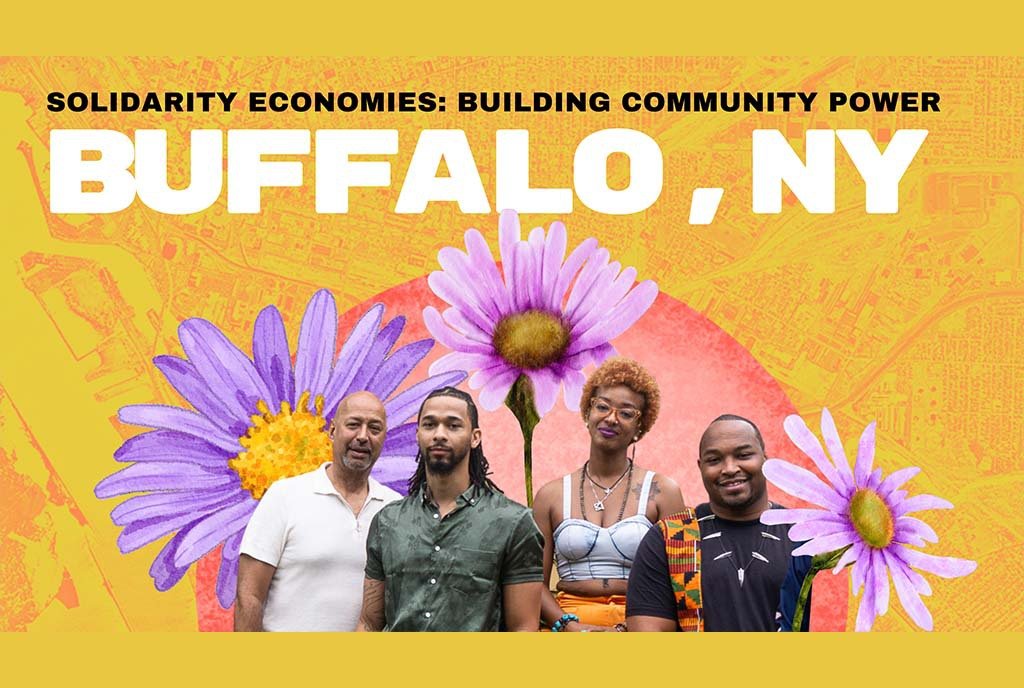
This is the fourth article in NPQ’s series Solidarity Economies: Building Community Power. Coproduced with the New Economy Coalition—a coalition of over 100 organizations building the solidarity economy in the United States—this series highlights case studies of solidarity economy ecosystems that are returning wealth and building grassroots power in cities across the country.
When the founding worker-owners of BreadHive Worker Cooperative Bakery moved out of the housing co-op kitchen where they tested recipes on friends and roommates and began selling loaves of bread out of a take-out window at their new wholesale bakery, they knew they were not the only ones who were benefitting from the worker co-op they were creating.
We treat cooperative development work not as a static formula, but as a learning laboratory.BreadHive’s journey and the lessons they learned along the way became the seed of Cooperation Buffalo, a shared resource network. We are a community-led resource center, a team of cooperative business developers and educators, and a community-controlled non-extractive loan fund. Together, we are planting, cultivating, and harvesting the seeds of a burgeoning solidarity economy.
Doing for Ourselves
Buffalo is known for powerful snowdrifts and pro football. But like fellow Rust Belt cities across the Midwest, it’s also known for shuttered factories; capital flight; the “brain drain” of departing college-educated young people; and the legacies of urban renewal, redlining, and other racialized policy decisions that make it one of the most racially segregated metropolitan regions in the nation.
In the absence of an economy that works for us, the people of Buffalo, we have learned time and again to do for ourselves. We treat cooperative development work not as a static formula but as a learning laboratory where experimentation, creativity, and new expressions of leadership are accepted and encouraged. We enter this work with the assumption that “no one knows everything, but together we know a lot.” It’s the pooling and sharing of resources—knowledge, expertise, relationships, money—that create the conditions for worker-led and community-owned enterprises to move the needle on issues plaguing our neighborhoods and to advance economic, environmental, and racial justice.
Cooperation Buffalo began by pooling those resources we had on hand: the roadmap laid out by BreadHive’s founders, identifying local legal and tax experience with co-ops, a strong relationship with the Small Business Development Center (SBDC) at SUNY Buffalo State for technical support, and equally strong relationships with base-building organizations like PUSH Buffalo that were helping neighborhoods define and articulate their needs. Our first donation came from Lexington Co-op Markets, a longstanding Buffalo grocery co-op whose workers have recently won a union contract.
In 2018, for the first time, we converted an existing business—Rose Garden Early Childhood Center—to worker ownership, as the business’s employees bought out the founding owner. A year later, we hired our first full-time staff. Today, there are four times as many worker co-ops in the region than when we started.
Our burgeoning cooperative economy in Buffalo is fueled by the vision and the ingenuity of people who are solving problems together. Below, we highlight three examples from our cooperative ecosystem.
Whether it is a worker co-op restaurant that pays living wages of $22 an hour, the provision of affordable housing, or a new composting operation, Buffalo residents are developing an increasingly sophisticated network of businesses that are succeeding at meeting vital community needs.
Economic Justice: Extra Extra
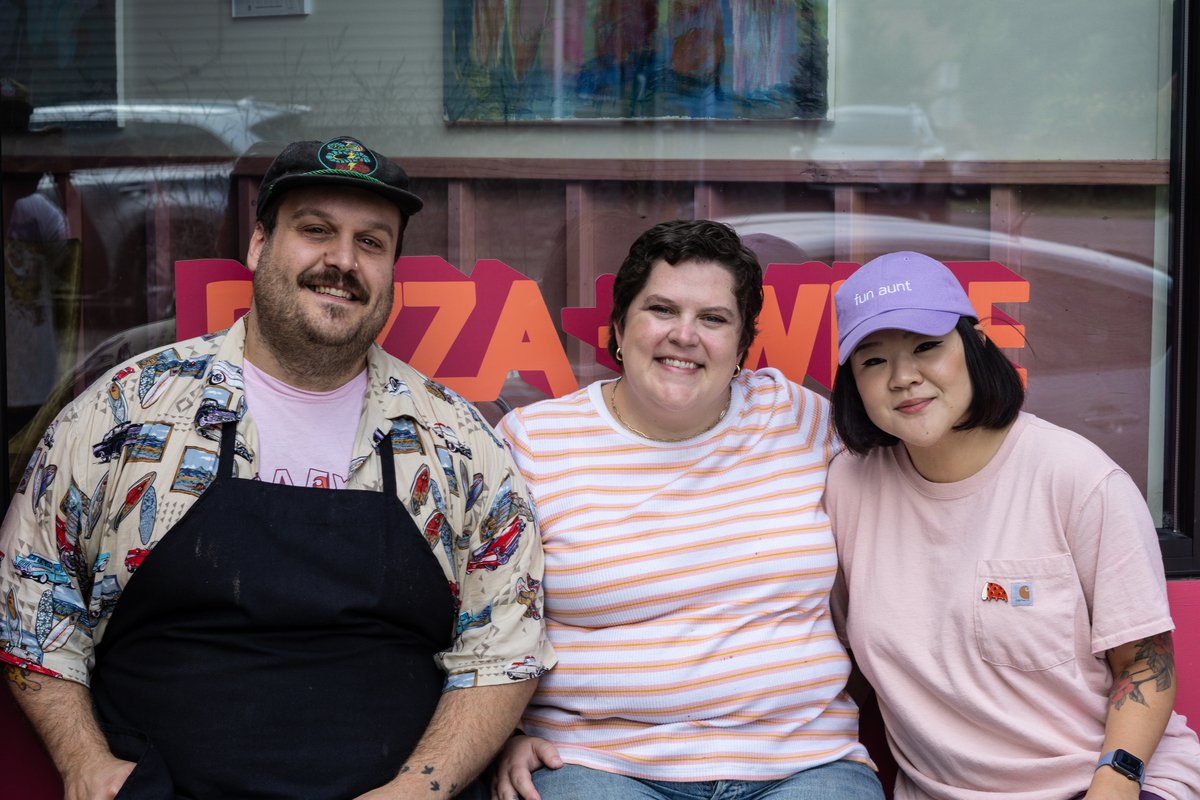
Standing behind the bar at Extra Extra Pizza, worker-owner Soon Ho Sim reflects on the economic precarity that led her to form a worker cooperative with fellow restaurant-industry workers Joey Pucciarelli and Bridget Murphy. “The three of us had such varied but consistent experiences in the restaurant industry before Extra Extra,” Sim explains. “That gave us a very in-depth look, from all angles, at how much traditional business methods were not working for the people working in the lowest rung of restaurants, and specifically for us.”
The three founders began searching for business models that would allow them to better meet their needs. “The cooperative model is less about centering profit, but more about centering people,” explains Sim. “And it allows us to draw strength from many different people as opposed to relying on one or two people to do everything.”
The trio participated in our Cooperative Academy, a multiweek accelerator program where teams of co-op entrepreneurs gather the knowledge and relationships necessary to pursue their shared vision. Based on the pioneering work of Green Worker Cooperatives in the Bronx, our Academy is a key building block of our approach to cooperative development. The program includes classroom training in business development, finance, governance, democratic decision-making, and participatory management. It also develops a cohort of co-op entrepreneurs from different backgrounds and industries who learn from each other—and connects them to the existing cooperative ecosystem.
The Academy gave Pucciarelli, Murphy, and Sim the space to design a business that would provide benefits and stability sorely lacking in the industry. In 2022, they opened Buffalo’s first cooperatively owned pizzeria and wine bar.
The restaurant is tipless by design, with the costs of good wages priced into the menu instead. “We’re not quite where we want to be yet, as we are in the first year of business. But right now, everyone’s making $22 an hour,” says Sim. “And there’s no wage discrepancy [between roles], which is a really big issue that has been spoken about in the industry for a long time but seen very little action.” The team is also working to generate enough earnings to provide health insurance, paid time off, and sick leave—a rare level of economic security for restaurant workers.
Now, new members of the Extra Extra team who have completed a probationary period as workers are preparing to step up into ownership themselves. As part of their onboarding, they complete the training curriculum of the Cooperative Academy, developing skills and forming relationships to help their co-op be sustainable.
Sim recognizes the important role that Extra Extra plays in the transfer of knowledge and skills to the next generation of worker cooperatives in Buffalo. “People ask, ‘How does this work? How can we do this?’ It’s positive, it’s inspiring, and it’s also very moving because it feels like we’re sharing the possibility that we have seen for ourselves with other people.”
“To some people that might not seem like very much, but for us, it seems like people are ready for this kind of change from an extractive model to a regenerative model,” Sim acknowledges. “Sometimes, it’s scary and confusing, but it’s also great. It’s something that we can be on the floor doing in real life instead of hoping about it or dreaming about it.”
Racial Justice: Mondragon Village Association
Dr. Curtis Haynes, Jr. has taught economics at Buffalo State University for nearly 30 years. A contemporary and classmate of Dr. Jessica Gordon Nembhard, Haynes has sought out relationships, resources, and research to understand the potential and impact of cooperative economic development to improve the socioeconomic conditions of Black Americans.
As a student of Black political economy and a self-proclaimed “scholar-activist,” Haynes has regularly brought his scholarship off campus, where principles can be tested against practice. This applied research is not only academic. His lived experience as a Black man in America makes this work deeply personal.
“Black Americans, by and large, from our transition from free people on the African continent through slavery, through sharecropping and entering into a modern capitalist economy, any attempt for us to develop a capitalist class was squashed,” explains Haynes. “Through the Black Wall Street massacre in Tulsa, through redlining and urban renewal…the ability to access capital, the ability to access material wealth in the capitalist economy, it was there, but there was a wall around it. And Black Americans weren’t able to pierce that wall, particularly as owners.”
It is against this backdrop that the Mondragon Village Association was formed. A nod to Mondragon Corporation, the world’s largest worker cooperative network based in the Basque Country region of Spain, this Black-owned real estate investment cooperative aims to make homeownership accessible and permanent for a demographic of Buffalo that is far more likely to experience generational poverty than generational wealth. By pooling resources and uniting under a collective purpose, the cooperative endeavors to offer affordable housing and counter the displacement of residents due to gentrification.
Sign up for our free newsletters
Subscribe to NPQ's newsletters to have our top stories delivered directly to your inbox.
By signing up, you agree to our privacy policy and terms of use, and to receive messages from NPQ and our partners.
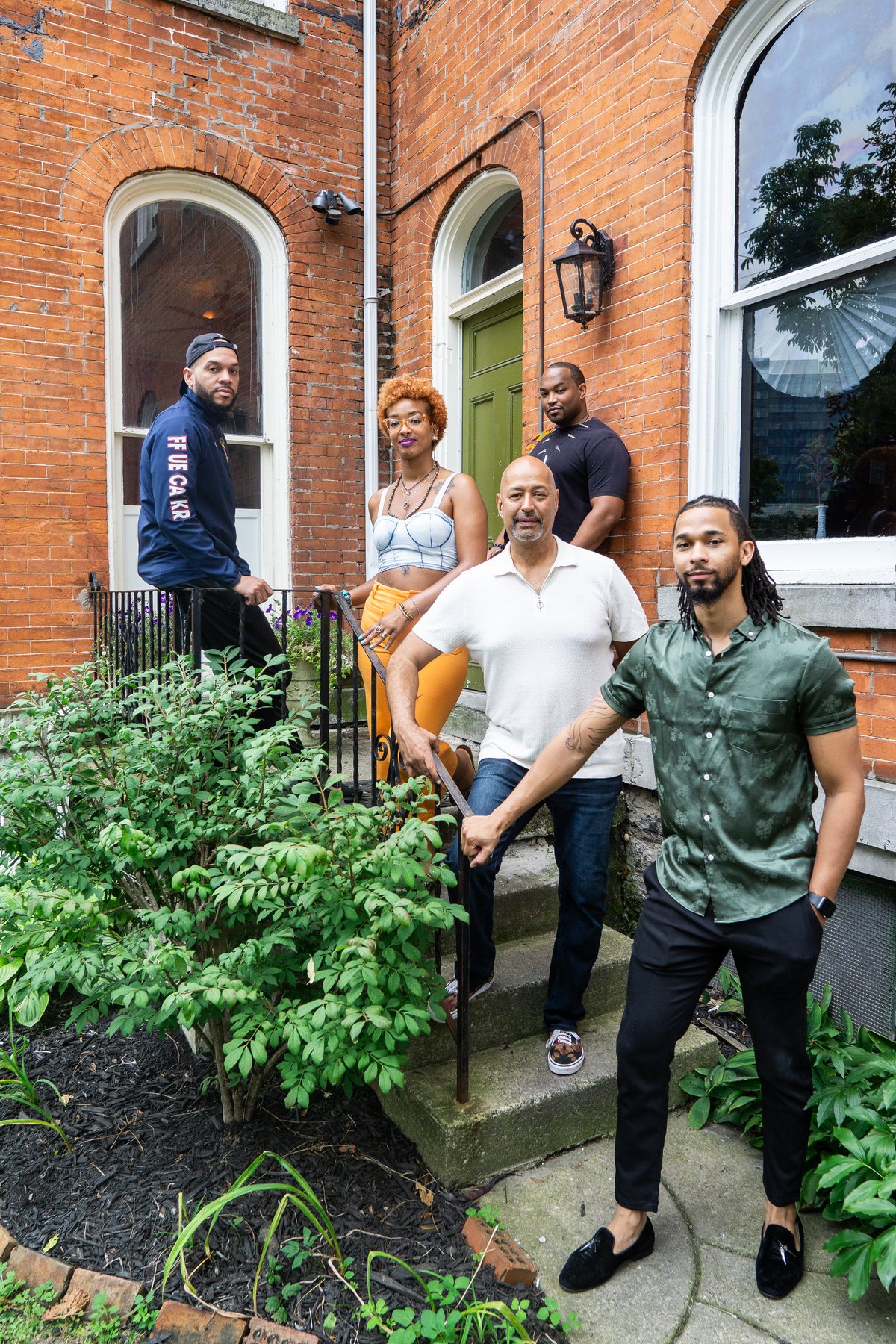
Mondragon Village Association officially transitioned to cooperative ownership in January 2023, after Haynes handed the reins of a three-unit apartment building to a cooperative of fellow community activists and residents. They came together around a shared interest to practice cooperative ownership for the first time. Now, Haynes is one of many owners.
“Just a few weeks ago, we had a meeting where I held a particular view. I strongly held that view, but through the democratic process, I lost the vote,” he explains. “I am the founder, and I have strong views on our direction, but I trust that the human beings who have committed to this project take their rights and responsibilities as co-owners seriously.”
Trusting his abilities as a theoretician and knowing his limited experience as a practitioner, Haynes sought support from Cooperation Buffalo in designing an appropriate governance and management structure for this new cooperative, one that could balance the team’s goals of “decentralized control and centralized management”—that is, management with strong democratic oversight. Several of the co-op’s founding members attended our Cooperative Academy training, and our cooperative developers with experience owning and managing worker cooperatives and housing cooperatives mapped out the broad strokes of an ownership structure, an operating agreement, and a pro forma (budget spreadsheet) with the founding team. We then paired them up with a local cooperative attorney to work out the details.
On the surface, the business development and training Cooperation Buffalo provides looks similar to other business incubators. But in addition to industry experience, “hard” business skills, and access to resources, we emphasize experimentation, self-determination, the value of lived experience, and the cultural norms of the co-op’s owners. The ownership structure of Mondragon Village Association derives from the co-op members’ existing bonds and values.
Several years ago, Haynes opened his home to friends, former mentees, and collaborators to have a shared space to study cooperative economics and build shared wealth. “It became both our business home and our social home,” he recalls. “It became what we called our dojo: a place where pioneering people would come to polish their spirit. We developed a curriculum built around the idea of mentorship, economics, and leadership.” The shared commitment to learning became a founding principle of the real estate company.
The goal? “A solid business model where humanity comes before profit,” says Haynes, “where we expand a loving community, and where we make the transition from an economics of scarcity to an economics of abundance.”
Environmental Justice: Farmer Pirates Compost
Across the city, Terra Dumas is hard at work creating abundance from waste—more specifically, creating rich compost from neighbors’ food scraps—at the work site for Farmer Pirates Compost. Conceived from a producers’ co-op of urban farmers who needed fertilizer to amend the harsh city soils where they grew their crops, the company now hauls and composts food scraps for hundreds of residential and commercial customers, diverting waste, healing soils and ecosystems, and reducing the climate impacts of municipal solid waste.
Dumas, along with co-owners Josh Poodry, Ignacio Villa, and Tucker Stevens, transitioned the company to a worker cooperative with the support of Cooperation Buffalo earlier this year. “We always knew that we wanted to function like a worker cooperative,” says Dumas. “We wanted a model where everyone who is working with us can have the same benefits, whether that’s financial or decision-making. It’s very rewarding to see something that you’ve directly contributed to creating do well, and for you to do well in return.”
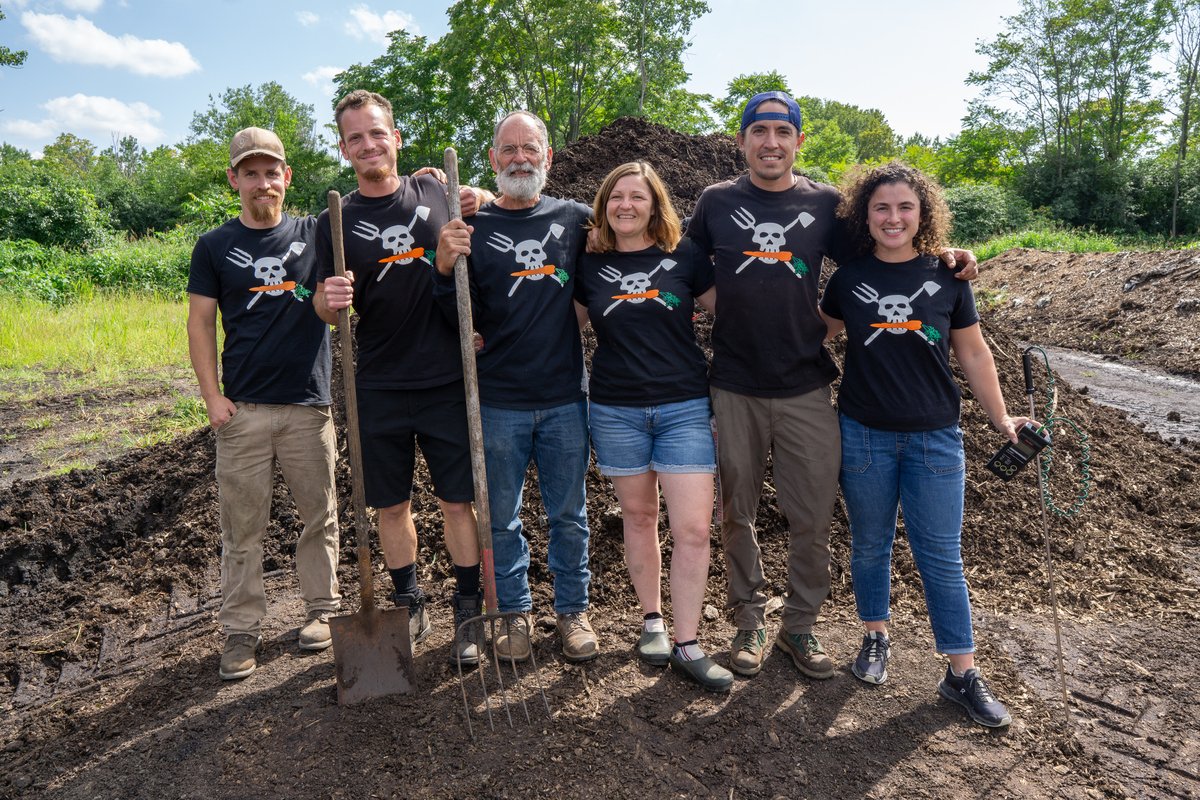
While the shared knowledge and relationships gathered and disseminated to co-op entrepreneurs was useful for Farmer Pirates Compost, the most valuable resource in this case was lending capital. As a member of Seed Commons, a cooperative of locally rooted, non-extractive loan funds, Cooperation Buffalo was able to secure just under $90,000 for Farmer Pirates Compost to purchase a new compost vehicle and gear up for a first-of-its-kind contract with the City of Buffalo.
“It’s a pilot program,” Dumas explains, “offered to 2,000 residents in the city to start separating out their food scraps, putting them in a separate tote, and bringing it to the curb along with their garbage and recycling. We then pick up the food scraps, and compost it right here in the city.”
“As farmers and homesteaders, we’re growing for ourselves….If that makes us pirates, then so be it.”That compost, when it’s deployed, has a real impact. Buffalo has been cited as a “Troubled Community” for lead levels: a devastating mix of old housing and high poverty creating the perfect conditions for one of the worst childhood lead poisoning problems in the country. In 17 city zip codes, the rate of tested children with high lead levels was double that of Flint, MI. Rich organic compost can act as a mitigator, diluting lead in the soil to safer levels.
Farmer Pirates Compost regularly raises awareness around soil health, waste diversion, and urban gardening. Recently, it organized a Soil Health Day in collaboration with Greater Buffalo Urban Growers and Cornell Cooperative Extension to engage in education around improving soil health and safely growing your own food. They are working to form a collaborative of local composting businesses and advocates for shared learning and support.
Putting people over profits in the cooperative model allows Farmer Pirates Compost to focus on what matters to them, including playing their part in climate change mitigation and environmental justice. “If everybody were to grow their own food, if everyone were to compost in their backyard and we went out of business, that would be great,” says Dumas. “I’m pretty sure that that’s not going to happen, at least not anytime soon. But the goal is larger than us.”
The Farmer Pirates named themselves after the writings of farmer and author Lynn R. Miller who wrote Farmer Pirates and Dancing Cows explains Dumas. “As farmers and homesteaders, we’re growing for ourselves, we’re creating for ourselves, we raise our own chickens for our own eggs, and we’ll do it outside of existing institutions. If that makes us pirates, then so be it.”
Nurturing cooperatives to grow and create for themselves requires democratizing the tools of business development.
Growing in Solidarity
Nurturing cooperatives to grow and create for themselves requires democratizing the tools of business development—sharing capital, training, knowledge, and relationships. The result is shared responsibility.
As the cooperative economy in Buffalo continues to grow, Cooperation Buffalo views our role as facilitator of that sharing. Cooperation and democracy require infrastructure that is responsive and relevant to the people who utilize it. As cooperatives mature in our ecosystem, they will join Cooperation Buffalo’s governance and shape the direction and composition of this shared infrastructure for themselves and future generations.
This shared responsibility is what we believe will lead to a more resilient Buffalo economy and more secure livelihoods for our neighbors.
“It feels bigger than just us,” explains Dumas. “Now we’re part of this community of people where the intention is to support each other and help each other and share information. It really makes all of it seem much more fulfilling and exciting and less scary. We’re more secure when we work together. It’s an ecosystem built on solidarity.”


